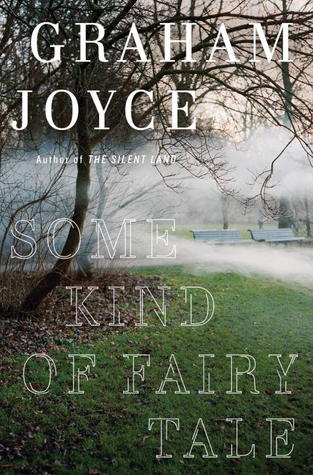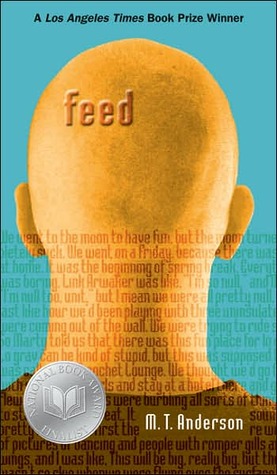Between a reasonable commute time
and a kitchen well away from the family television I get a fair bit of
time each day to listen to podcasts. Predictably, many of the podcasts I
listen to concern science fiction and fantasy reading. (Science and
politics round out the rest.)
The topic is relevant to the blog, as these podcasts are often the reason a book gets added to my to read list or gets bumped up.
A case in point is The Writer and the Critic, an Australian podcast that reviews a couple of books every month (except for a recent hiatus). The format is a conversation between horror and fantasy writer Kirstyn McDermott and podcaster and critic Ian Mond over books they have selected to read and review. It's an interesting podcast for me because they have such a different taste in books. Kirstyn has a real taste for dark and complicated and Mondie is a bit of a snob (of the school of it was hard to write, it should be hard to read).
 This month's reading were Some Kind of Fairytale by Graham Joyce and Feed by M. T. Anderson.
Some Kind of Fairytale is a magical realist novel set in rural England
where a girl disappears for twenty years and returns looking much the
same age and with a bizarre story. The tale deals with how the various
people in the community deal with her return and with all the different
levels of belief, from one character who knows she's telling the truth
to complete disbelief even when faced with incontrovertible evidence.
The story isn't about being kidnapped by fairies as such; it's far more
about faith, belief, love and being touched by things a bit beyond the
ordinary. It's also very literary, so probably isn't for everyone. In
term of the podcast I'm reading it for, Ian Mond is going to love it
because it's a literary book that leans towards the fantastic, and
Kirstyn is going to love the story's dark side.
This month's reading were Some Kind of Fairytale by Graham Joyce and Feed by M. T. Anderson.
Some Kind of Fairytale is a magical realist novel set in rural England
where a girl disappears for twenty years and returns looking much the
same age and with a bizarre story. The tale deals with how the various
people in the community deal with her return and with all the different
levels of belief, from one character who knows she's telling the truth
to complete disbelief even when faced with incontrovertible evidence.
The story isn't about being kidnapped by fairies as such; it's far more
about faith, belief, love and being touched by things a bit beyond the
ordinary. It's also very literary, so probably isn't for everyone. In
term of the podcast I'm reading it for, Ian Mond is going to love it
because it's a literary book that leans towards the fantastic, and
Kirstyn is going to love the story's dark side.
Feed, on the other hand, was harrowing. It's one of these heavy-handed dystopian future science fiction books, this one warning/critiquing the ubiquity of internet culture, advertising and consumerism. In this future nearly everyone in the USA is connected to the internet via a direct brain implant which they have little control over and pipes continuous and uncontrollable advertising directly into there heads. The main character is a vapid teenage boy who reads like the absolute worst caricature of a modern teenager but is nevertheless better than most of his friends. He meets a girl who is one of the few people who still has some idea of what life is like without the feed. It gets a bit tragic from there as both the society and the girl collapse in horrible ways as the book grinds on. It's heavy-handed, but still brilliant and therefore very unsettling. Unfortunately, I think it falls to one of the classic issues with dystopian books in that I don't think that this is a plausible path for our society. It's a bit like the Hunger Games - I don't think you can get there from here.
I'm also a fan of the SF Squeecast, a panel discussion between a group of speculative fiction writers including Lynne Thomas, Paul Cornell, Seanan McGuire, Catherynne Valente and Elizabeth Bear and usually including guests. That's a formidable list of highly awarded writers and the mission of the panel is to "squee" about things (books, television, movies, etc) that the panelists love. It's a pleasantly positive approach to reviewing science fiction and fantasy and it has placed many a book on my to read list including Bitter Seeds by Ian Tregillis.
I'll add the rest of the science fiction and fantasy podcasts in the next post.
Currently Reading: I'm way behind with my blogging. I've recently read Seven Wonders by Adam Christopher (good, but with some major structural issues that made it quite difficult to read), the Cold King by Amber Jaeger (nice little self-published version of Beauty and the Beast), In the Company of Ogres by A. Lee Martinez (not his best) and Black Wings by Christina Henry (average urban fantasy). I'm actually reading Seraphina by Rachel Hartman.
The topic is relevant to the blog, as these podcasts are often the reason a book gets added to my to read list or gets bumped up.
A case in point is The Writer and the Critic, an Australian podcast that reviews a couple of books every month (except for a recent hiatus). The format is a conversation between horror and fantasy writer Kirstyn McDermott and podcaster and critic Ian Mond over books they have selected to read and review. It's an interesting podcast for me because they have such a different taste in books. Kirstyn has a real taste for dark and complicated and Mondie is a bit of a snob (of the school of it was hard to write, it should be hard to read).
 This month's reading were Some Kind of Fairytale by Graham Joyce and Feed by M. T. Anderson.
Some Kind of Fairytale is a magical realist novel set in rural England
where a girl disappears for twenty years and returns looking much the
same age and with a bizarre story. The tale deals with how the various
people in the community deal with her return and with all the different
levels of belief, from one character who knows she's telling the truth
to complete disbelief even when faced with incontrovertible evidence.
The story isn't about being kidnapped by fairies as such; it's far more
about faith, belief, love and being touched by things a bit beyond the
ordinary. It's also very literary, so probably isn't for everyone. In
term of the podcast I'm reading it for, Ian Mond is going to love it
because it's a literary book that leans towards the fantastic, and
Kirstyn is going to love the story's dark side.
This month's reading were Some Kind of Fairytale by Graham Joyce and Feed by M. T. Anderson.
Some Kind of Fairytale is a magical realist novel set in rural England
where a girl disappears for twenty years and returns looking much the
same age and with a bizarre story. The tale deals with how the various
people in the community deal with her return and with all the different
levels of belief, from one character who knows she's telling the truth
to complete disbelief even when faced with incontrovertible evidence.
The story isn't about being kidnapped by fairies as such; it's far more
about faith, belief, love and being touched by things a bit beyond the
ordinary. It's also very literary, so probably isn't for everyone. In
term of the podcast I'm reading it for, Ian Mond is going to love it
because it's a literary book that leans towards the fantastic, and
Kirstyn is going to love the story's dark side.Feed, on the other hand, was harrowing. It's one of these heavy-handed dystopian future science fiction books, this one warning/critiquing the ubiquity of internet culture, advertising and consumerism. In this future nearly everyone in the USA is connected to the internet via a direct brain implant which they have little control over and pipes continuous and uncontrollable advertising directly into there heads. The main character is a vapid teenage boy who reads like the absolute worst caricature of a modern teenager but is nevertheless better than most of his friends. He meets a girl who is one of the few people who still has some idea of what life is like without the feed. It gets a bit tragic from there as both the society and the girl collapse in horrible ways as the book grinds on. It's heavy-handed, but still brilliant and therefore very unsettling. Unfortunately, I think it falls to one of the classic issues with dystopian books in that I don't think that this is a plausible path for our society. It's a bit like the Hunger Games - I don't think you can get there from here.
I'm also a fan of the SF Squeecast, a panel discussion between a group of speculative fiction writers including Lynne Thomas, Paul Cornell, Seanan McGuire, Catherynne Valente and Elizabeth Bear and usually including guests. That's a formidable list of highly awarded writers and the mission of the panel is to "squee" about things (books, television, movies, etc) that the panelists love. It's a pleasantly positive approach to reviewing science fiction and fantasy and it has placed many a book on my to read list including Bitter Seeds by Ian Tregillis.
I'll add the rest of the science fiction and fantasy podcasts in the next post.
Currently Reading: I'm way behind with my blogging. I've recently read Seven Wonders by Adam Christopher (good, but with some major structural issues that made it quite difficult to read), the Cold King by Amber Jaeger (nice little self-published version of Beauty and the Beast), In the Company of Ogres by A. Lee Martinez (not his best) and Black Wings by Christina Henry (average urban fantasy). I'm actually reading Seraphina by Rachel Hartman.

No comments:
Post a Comment